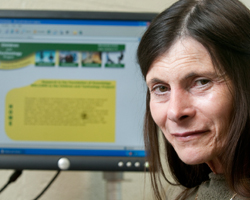Morality vs. E-Morality
- Linda A. Jackson
- Professor, Department of Psychology
- College of Social Science
Children's Perceptions of Ethics Online
Linda Jackson has been studying children's interactions with the Internet for almost as long as there's been an Internet. Her focus on how young people function in the virtual world began with the HomeNetToo project (2000-2005), which looked at Internet use among low-income families, and continues through her current NSF-funded study, the Children and Internet project, about the affects of Internet use, videogame playing, and cell phone use on middle school students' academic, moral, and social development.

"Kids are living a whole second life within virtual reality," said Dr. Jackson. "A significant minority is encountering problems, both personal and social. Technology use may exacerbate problems in real life, like social isolation or conflicts with peers and parents. We need to identify the moral code applicable to the virtual world and how it relates to real life moral decision making and behavior. For example, cyberbullying and the distribution of personal pornography are increasing in the virtual work but not in the real world."
Jackson also observes problems arising from lack of social connectedness. "With the increasing number of handhelds, people talk less to each other," she said. "My own students walk around with cell phones glued to their ears immediately after leaving class and sometimes during it. Rarely do they take the time to chat with others sitting right next to them. Instead they check and send text messages and set up their laptops—mostly to check e-mail, not to access class material online."
Another consideration, especially in higher education, is that the academic benefits of having the world of knowledge at your fingertips is offset by the ease with which plagiarism has become a frequent if not common occurrence. "From the kids' point of view it's not plagiarism," said Jackson. "They don't understand property rights. I tell my students about acceptable use policy but they don't see it as a moral imperative. It is becoming increasingly difficult to explain to students why certain behaviors constitute cheating."
Some surprisingly positive effects
On the other hand, Dr. Jackson recently received world-wide media attention for some surprisingly positive results from her current project that she and MSU co-investigators Alexander von Eye, Hiram E. Fitzgerald, Edward A. Witt, and Yong Zhao reported in February 2009, in a paper presented at the International Association for Development of the Information Society conference in Barcelona, Spain.
Working with more than 20 middle schools and almost 700 children in central Michigan, Jackson's research team not only found that cell phone use had no harmful effects on middle school students' academic performance; they also noted a positive link between video games and visual-spatial skills, which, as Jackson pointed out, "are the 'training wheels' for performance in science, technology, engineering, and math."
For better or worse the Internet, videogames, and cell phones are not likely to go away in the foreseeable future. For this reason, according to Jackson, more research needs to focus on harnessing children's attachment to these technologies to their academic, social, psychological, and moral good.
It's the issue that drives Dr. Jackson's work. "We need to learn what children think the virtual world is, how it connects to the real world," she said. "Forget privacy. It's not there. If you put it on a computer or in your phone, it's public. We need to emphasize this."
Differences between real world and virtual world behavior
She also has found that real-world behavior "does predict moral behavior online somewhat. But it's not strongly connected. There are differences between real and virtual behavior and we need to find out what those differences are. Why does perceived privacy make people feel justified in behaving badly? We need to educate our youth about online morality. But first we have to figure out what they think it is."
The earlier HomeNetToo study found that poor kids did significantly better academically with an introduction to the Internet and supportive services to help them learn how to navigate it. Musing on the possible reasons for this success, Jackson hypothesized, "In poor families the Internet is a family resource to be found on the kitchen table or next to the TV. This decreases the possibility of questionable moral behavior and may increase the likelihood that the Internet will do what it is intended to do—level the playing field so that all children, rich, poor, and in between, may tap into the same resources to understand the world they live in."
- Written by Linda Chapel Jackson, University Outreach and Engagement
- Photographs courtesy of Greg Kohuth, University Relations